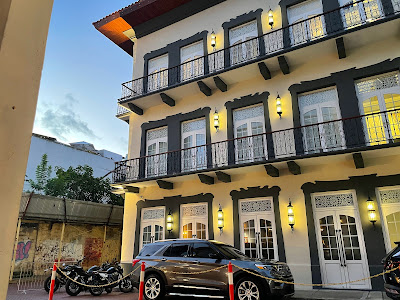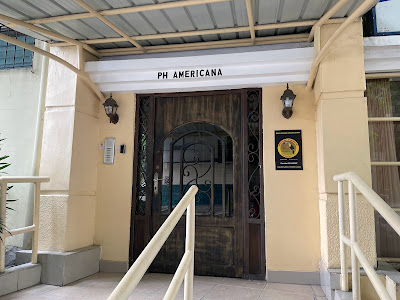Turns out there are a lot of pros and cons to living in Panama.
To attract retirees, Panama has a discount program for foreign residents of any age who are living in the country under a Pensionado visa. The same discounts are given to all female residents after age 55 and all male residents after age 60. Most of the time I just show my national ID (cédula) to receive the discount, but sometimes it takes effort.
The discounts are substantial, and include 25% off utility bills, 25% off airline tickets, 20% off doctor’s bills and 15% off dentist’s visits. There is also a 50% discount at hotels during the week, but it can be limited to certain rooms or come with other restrictions.
Hotel La Compañia in Casco Viejo
On the other hand, getting useful information is sometimes a challenge, as Panamanians often have a roundabout way of answering questions. There's an expression among expats called TIP or This Is Panama, which roughly means "it is what it is."
TIP means repairmen show up when they do, stores will stock an item one day and not the next, some prices are negotiable, and information on a website may or may not be accurate. There are no street addresses, so directions can be an adventure. Parades, protests, and shutdowns seem to happen randomly.
Initially language was a significant, but not insurmountable barrier to getting what we wanted. Some locals speak some English, but our lives got easier once we learned more Spanish. Still our conversations tend to be a crazy mix of Spanish, English, and Google translate, but with a little good humor it works.
When we first arrived in Panama I spoke no Spanish and quickly hired Alicia, a private tutor who came to our apartment for one hour in the mornings, four days a week. In March, I started at the Spanish Panama school and took two, two-hour lessons each week with Victoria. I also practice daily on the Duolingo app, but even so I’m a long way from fluent.
The Spanish Panama Language School
We’ve had to go metric and now measure our morning walks in kilometers. We buy 250 grams of meat at the deli counter, not half a pound. And it’s fun to drive 100 km (62 mph) on the highways.
Panama has maintained a much stricter Covid protocol than the U.S., and events are only now returning. The city’s famous Carnival parade was canceled again this year. We’ve been to smaller outdoor festivals but not an indoor movie theater. Restaurants are back to operating at full capacity, but it seems a lot of places didn’t survive the pandemic.
Police are far more visible and have much more discretion in Panama than in the U.S., and traffic stops are routine. Heavily armed police stand patrol on the streets and ride motorcycles through the city. The homicide rate is higher than in the U.S., but confined to the drug trade. Random school or grocery store shootings are nonexistent.
Panama is predominantly Catholic, with relatively high rates of literacy and education. School children wear uniforms and saints are honored with lit candles. Still, there was a raucous Pride celebration at the end of June this year in Parque Urracá with a deejay, dancing, and fireworks.


No comments:
Post a Comment